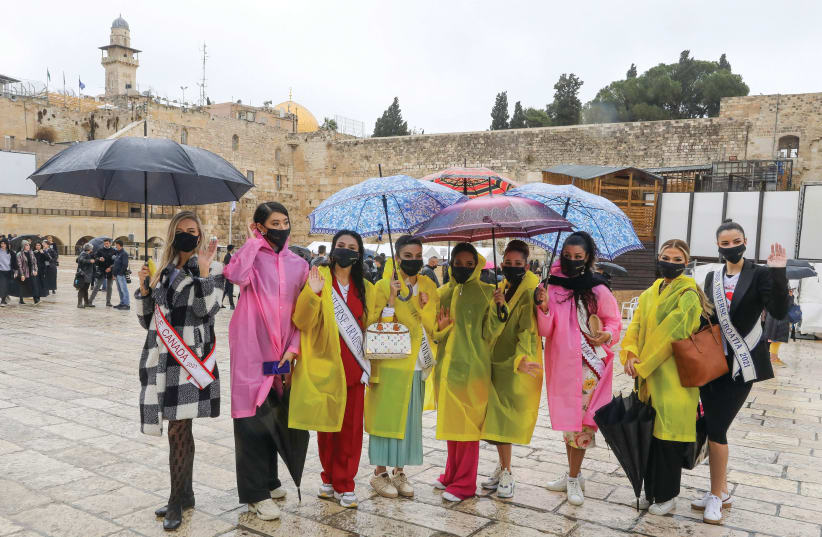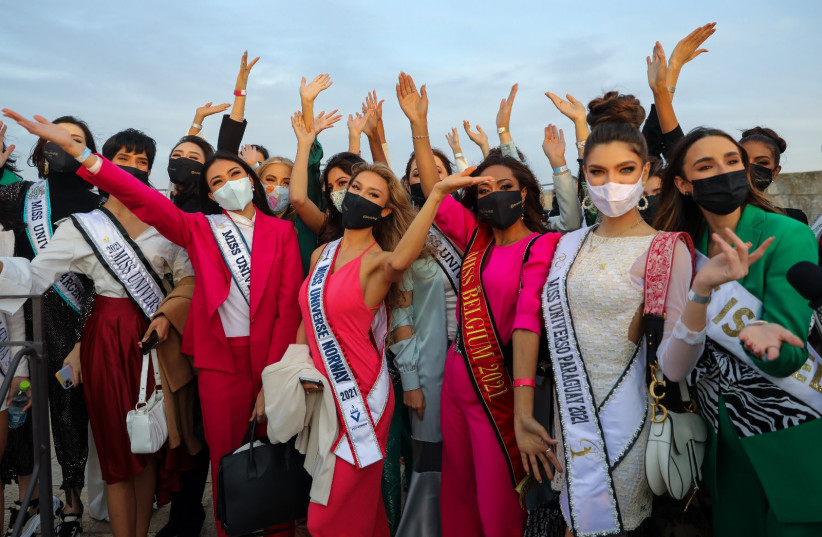The closest I have ever got to experiencing a beauty pageant is periodically watching the perennially funny Miss Congeniality. At some point in my childhood, it became clear that I didn’t have the looks or outlook to be a beauty contestant. By my teens, something else became apparent – growing up did not necessarily mean growing taller. There is no room for the vertically challenged in the brutal world of fashion and beauty pageants. It’s a form of discrimination that’s often overlooked. Well, when you’re only five-foot tall, you get used to being literally overlooked and have to find other ways to stand out.
The beauty contest phenomenon has been on my mind. The 70th annual Miss Universe competition is scheduled to take place in Eilat on December 12 and dozens of participants this week descended, gracefully, on Jerusalem.
COVID-19, of course, has had an impact on the event. The outgoing Miss Universe, the definitely deserving Miss Mexico Andrea Meza, only reigned for a few months after the previous competition was postponed. And last week the world learned another letter in the Greek alphabet as the Omicron variant triggered a global panic attack. (Miss France was confirmed as suffering from the new mutation of the disease and was not on the scene this week.)
But it was a much older pandemic that hovered in the background of the international contest: antisemitism, or at least its modern form, anti-Israelism. As soon as the venue of this year’s event was published, the ugly face of the Boycott, Divestment, Sanctions movement jumped into the picture. Similar to the lead-up to the Eurovision Song Contest in Tel Aviv in 2019, BDS groups began harassing potential participants and calling for a boycott of the competition simply because it was being held in the Jewish state.
Miss Malaysia had the equivalent of a diplomatic headache, her country declining to allow her to come citing coronavirus concerns. It was not hard to scrape the veneer off this excuse. This week the Men’s World Team Squash Championship was canceled as the largely Muslim country which was scheduled to host it refused to admit Israeli competitors. Talk about bad sports. Fortunately the World Squash Federation did not give in to this atrocious example of discrimination and scrapped the event rather than leave the Israelis out in the cold.
The worst case of bullying was reserved for Miss South Africa, Lalela Mswane, who deserves a prize for standing up and being counted. Despite a massive campaign by Africa 4 Palestine and other anti-Israel groups, leading to the South African Ministry of Culture withdrawing its backing, Mswane arrived as planned.
Proving that she’s not just a beautiful face, Mswane, a qualified lawyer, issued a statement saying, among other things: “There is no greater time to shed light on issues affecting women, to choose courage over comfort and to be steadfast in my beliefs regarding the advancement of women and our rights. I view my participation in the pageant as a unique opportunity to not only do just that but to also be part of, and hopefully contribute to, a process of dialogue and peace...”
I am no judge of beauty pageants or their contestants but it is clear that over the years both Miss Universe and its rival Miss World have made an effort to move away from the pure objectification of women’s bodies and to help competitors affect positive change – from models to role models. In many countries such pageants are a respected means of breaking out of a cycle of poverty and helping others do the same, much as many young South American men see soccer as an escape route.
The itinerary of Miss Universe contestants in Jerusalem took them to many different locations including the Western Wall, the Tower of David, the King David Hotel, the Jerusalem Botanical Gardens – and one event that particularly caught my eye. On Wednesday night, after another ceremony lighting Hanukkah candles, several Miss Universe participants brought a touch of glamour and glitz to an unusual fashion show at The First Station featuring clothing from Haboydem. This is a nonprofit organization that runs a second-hand clothing store and provides employment training for people with disabilities, especially those recovering from mental health issues. The event was backed by Jerusalem Deputy Mayor Fleur Hassan-Nahoum, who enthuses about Haboydem “not only as one of the jewels in Jerusalem’s social impact business scene but also a go-to place for beautiful clothes.”
The message that it’s beautiful to recycle clothes and employ people with special needs deserves to go out from Jerusalem, whatever you think of beauty pageants.
IN MISS Congeniality Sandra Bullock plays hapless FBI agent Gracie Hart, who goes undercover to thwart an attack at the Miss America beauty pageant and learns the various tricks of the beauty queen’s trade on the way. Having played “Somewhere My Love” on glasses as her “talent” at the preliminary stage of the competition, disaster strikes ahead of the finals when the other contestants drink the water that creates the different notes. Quick-thinking Hart, an agent with an attitude, improvises by doing the only other thing she can do: SING. This is no song-and-dance act, however. The initials stand for the vulnerable places she teaches women to hit in self-defense: solar plexus, instep, nose and groin.
It’s a comedy movie, but the lesson is a serious one. Self-defense is a skill that women everywhere should learn. Take it from courageous real-life former Israeli beauty queen Linor Abargil. She was crowned Miss Israel in 1998, at the age of 18. Shortly before she competed in the Miss World competition she was raped in a particularly brutal manner. Nonetheless, she took part in the pageant and won the coveted Miss World crown. Beauty is more than skin deep. Abargil now uses her experience and high profile to help others. She earned a law degree and traveled the world talking to other rape victims, helping them to overcome unwarranted feelings of shame. The result can be seen in the compelling but painful documentary Brave Miss World.
Israel’s most famous former beauty queen, Gal Gadot, has described deliberately flunking in the Miss Universe competition because she wasn’t considering a modeling career. Indeed, after her compulsory military service, she began studying law before the dramatic career switch that led to her success as an actress and becoming known universally as Wonder Woman.
Curiously, Israel’s first and so far only Miss Universe, Rina Mor, who won in 1976, also went on to study law. Being beautiful obviously does not rule out being brainy and vice versa.
I was relieved this week to see that the Miss Universe contestants touring Jerusalem were able to be both beautiful and sensible – wearing masks against COVID, donning plastic rain coats when the weather made it prudent and wearing mercifully flat shoes and sneakers. As every woman knows, you can’t look good, or feel good, for very long when wearing uncomfortable shoes.
World peace, that traditional wish of beauty queens everywhere, is too much to hope for, but may Miss Universe successfully bring people together and overcome ugly hatred. And may the best woman win.
liat@jpost.com

